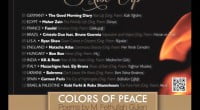Fountain’s Yeşilova: We believe human life and the universe are each a book to read

Date posted: February 27, 2015
AYDOĞAN VATANDAŞ / NEW YORK
English-language The fountain magazine Editor-in-Chief hakan yeşilova has said his magazine has an editorial policy that promotes love and respect for all, adding that they see human life and the universe as books that need to be read.
“We at The Fountain believe the world and our lives are precious and honorable and every individual innately deserves to be treated with love and dignity. The Fountain’s main mission is to raise awareness of this value by spurring both minds and hearts to operate cooperatively so that readers can read between the lines to discover a more meaningful world. We believe human life and the universe are each a book to read; each is necessary to decipher the intricacies of the other and the diverse fields of humanities, sciences and faith are useful tools in that direction,” he said in an exclusive interview with Sunday’s Zaman.
The Fountain Magazine, which started in 1993 in the UK, is one of the periodicals that reflect the intellectual dimension of one of the largest educational mass movements in the world.
Its origin actually goes back to the 1970s, when its Turkish edition, Sızıntı, was first published. The Fountain and its editions in a total of eight different languages offer an alternative intellectual experience to young adults and adults by providing content from across a rich variety of disciplines. Yeşilova said they make sure that the articles they publish are written in a style that everyone can relate to their lives.
“We hope our articles make our readers appreciate the priceless value of existence,” he said.
Yeşilova, a meticulous editor who loves grappling with contemplative words, travelling, meeting new people and experiencing new cultures, complained about how more and more green sites in İstanbul are being replaced with concrete buildings.
“I feel like a global citizen, yet still live in İstanbul, a city filled with love and faith and the sea. Yet sadly it is being invaded by concrete buildings and terrible city planning,” he said.
Could you please tell us when and why The Fountain Magazine was established? What was the goal and target audience?
The Fountain started in 1993 in England but its origins go back to the 1970s, when its Turkish edition, Sızıntı, was first published. There are nuances in each edition, but what I believe lies as the motivation to publish The Fountain and its editions in eight different languages is offering an alternative intellectual experience to young adults and adults by providing content from across a rich variety of disciplines. We make sure that these articles are written in a style that everyone can relate to their lives. We hope our articles make our readers appreciate the priceless value of existence.
What do you see worth publishing in The Fountain?
Any essay, fiction or non-fiction, any content from any genre with a universal appeal that is, of course, written in good English. The only condition is that they have the ability to engage readers across the globe in the contemplative way described above.
Tell us about your authors. Who can contribute to the magazine?
We have contributions from all over the world from authors from all sorts of religious, cultural and educational backgrounds. The Fountain touches upon universal themes and questions that have always intrigued human minds, regardless of their nationality and values. So, we consider more what is written than who wrote it.
There is something that I am curious about. You are publishing in a wide range of fields. What about your editors? Do you have editors who can evaluate all these articles across such a wide range of fields?
The Fountain is not an academic journal and the content we offer is very rarely brand new or speculative so as to challenge long-established trends and patterns in science, if at all. However, we have quite a long list of reviewers and experts from a diverse range of academic fields from prestigious universities whom we frequently consult for academic advice and guidance.
As far as I know, The Fountain is a member of a family of magazines like Sızıntı, Hira and Yağmur. What is the linkage there?
Each of these periodicals is one intellectual dimension of one of the largest educational mass movements in the world. Popularly called Hizmet, and mainly inspired by Fethullah Gülen, a very significant author and scholar originally from Turkey, this movement is active in over 160 countries, where it operates very successful schools, intercultural dialogue centers and relief work. In their own genres and separate editions, these magazines attempt to reflect the main philosophies of this movement that center around universal human values, peaceful coexistence, character education, respect for the sacred and every faith tradition, the importance of democratic values and equal opportunities to education and work.
Why is The Fountain different than other magazines with an interest in a wide range of fields?
The Fountain is for the human, and the human has desires, ambitions and interests in all possible fields of knowledge. Each and every person may feel more inclined to a certain field and infinitely expanding research and new findings often compel us to specialize more on one specific field. This often comes, unfortunately, at the expense of a countless number of other fields. This is a reality and makes sense to a certain extent. However, excessive compartmentalization of knowledge yields a rather patchy perception of life, which leaves a lot of existential questions unanswered. We at The Fountain believe a holistic perspective is needed to be able to relate our existence to the rest of nature, to concepts of good and evil, birth and death. This is why we would like to make diverse fields of knowledge available for everyone — perhaps not at their farthest edges of jargon, but at least at a minimum level of accessibility, so that no gaps are left unfilled on our journey to discovering who we are and why we are here.
Being in print for the last 20 years, what would be the biggest contribution of the magazine? And how do you measure this contribution?
Good question. Our contribution is not easy to measure, for our aim is to transform people’s hearts and minds. There are reading clubs dedicated to The Fountain that take place in different parts of the world and some of the feedback we receive from them is very positive. In my lectures and other events I participate in — events where I speak of the magazine and read some of its content — I can see people nodding their head affirmatively, their eyes opening wide in amazement and awe. Seeing this, and reading the feedback we get, my conscience tells me that our work is being endorsed and welcomed.
Anyone who skims through the magazine notices a significant emphasis on belief, spirituality and science with an Islamic flavor. Do you think the magazine appeals to people of different beliefs and different academic circles?
Since the magazine originated in Turkey and quite a number of our contributors who have been nourished from it have a Muslim background, their sources of reference tend to be more Islamic, thus the design and quotes, etc. However, we frequently publish people from different faiths, from Christian priests to Jewish rabbis. An ideal article for our magazine would be one that touches the heartstrings of every individual. We believe the essential tenets and values of each faith overlap extensively in a way so that any article which can speak on that frequency can be read by people of any belief.
Do you think science and religion are on a more peaceful track than they were before?
It depends on how you look at it. My belief is that they were never incompatible. It is a matter of perspective and choice.
Fethullah Gülen is your lead author. What would you see as his biggest impact on the magazine?
Gülen strives for peace; his cause is to restore the real value of the human being and he wants to do this in the most positive way: education and dialogue. His achievements are mainly due to his positive attitude, all-embracing sympathy, hope-inspiring message and a tender heart that is concerned for everyone. The Fountain and other publications inspired from his ideas have set these characteristics as their backbone, and believe it or not, our editors work really hard to shape our content accordingly.
Profile:
Hakan Yeşilova is the editor of The Fountain Magazine. With an education in language and political science, Yeşilova has been a professional publisher since 1995 with experience in various editorial and marketing positions in Turkey and the US. In addition to his editorial position, he organizes international conferences on themes explored in The Fountain, such as media ethics, education, peaceful coexistence and intercultural dialogue. He writes on civil society and human rights.
Source: Today's Zaman , February 27, 2015
Tags: North America | Peacebuilding | USA |
























